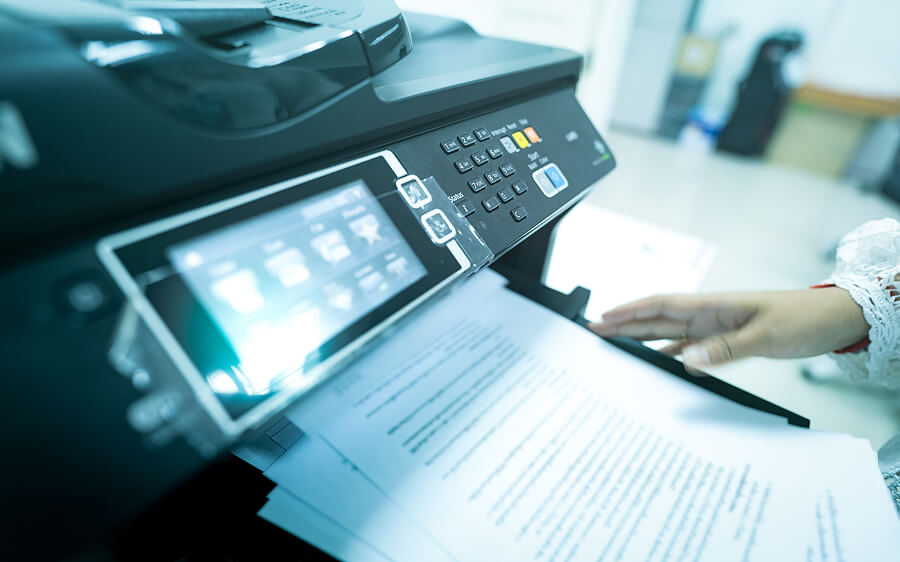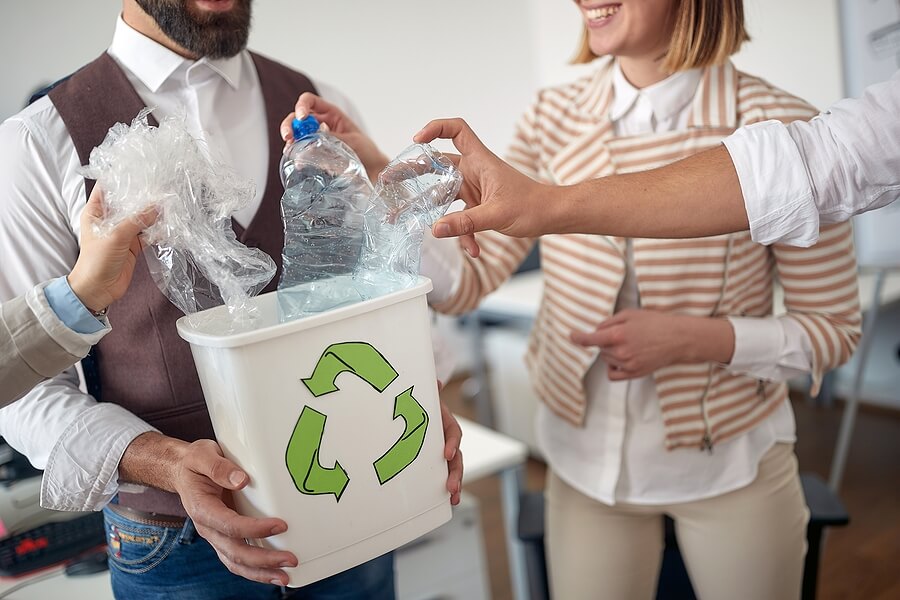In a perfect world, all managers and employees would know how to reduce office waste, as well as the reasons why it’s important to do so.
Reducing office waste improves resource efficiency, cutting down on the cost of materials, and has a positive impact on the environment and on office waste management costs.
Forge Recycling provide commercial waste management services to offices and as part of that, we want to help business owners and office managers to make the easy day-to-day changes that can cut office waste significantly over time.
Here are some of our top tips for how to reduce waste in the office, to keep your bins that bit less full between collection days.
Office waste reduction tips
We’ve been talking about how to reduce waste in the office for years – you can see our Top Tips for a Zero Waste Office here – but reducing office waste doesn’t mean you make no waste at all.
It’s all about the three Rs: Reduce, Reuse and Recycle. By following the simple tips below you can eliminate some of your waste, while also improving the environmental impact of the office waste you can’t avoid.
1. Know your waste
First and foremost, know how much office waste you produce. If you don’t normally keep a count of this, then book a free waste audit from Forge Recycling and we can come to your premises and recommend a commercial waste management plan for you.
2. Create your policy
Once you have your office waste management and recycling set up, back it up with a policy you share with your employees. Make sure people are engaged – don’t just email a link to your staff, have a face-to-face conversation and get them on board with reducing waste.
3. Lead the way
Be seen to take action. Some visible ways to do this include providing employees with reusable water bottles to reduce plastic waste. You could even get your company logo printed on them as an extra opportunity for some low-cost promo throughout your workforce.
4. Provide decent coffee
Takeaway coffee cups are a real problem. They’re getting better, but the remnants can mean even recyclable paper cups contaminate your office paper bins. Consider providing good-quality coffee in reusable cups to stop your staff from binning their takeaway empties in your paper recycling bins.
5. Work with experts
An initial office waste audit is a good start, but working with a professional commercial waste management company over time can make sure you keep on top of new recycling opportunities and best practices, for ongoing improvements.
How to reduce office paper waste
Stationery is one of the biggest expenses and biggest waste streams of a typical office, so knowing how to reduce paper waste in the office is a useful skill for employees and managers alike.
6. Don’t print
If you can avoid printing something out, that’s a sheet of paper that you don’t need to use. Normalise working with digital documents on-screen and as email attachments, rather than employees passing print-outs around.
7. Use both sides
Using both sides of the paper is an effective way to instantly halve your business paper waste. Enable duplex printing if your printer supports it, or use the backs of old print-outs for handwritten notes.
8. Print smaller
Encourage employees to print things smaller. Even a one-point reduction in font size or slightly narrower line spacing and margins will add up over a multi-page document.
9. Print as drafts
Printing in draft mode doesn’t directly reduce paper waste, but it will mean you use less ink or toner. The fainter printing of drafts also makes it easier to use the same paper again for handwritten notes and other purposes.
10. Encourage recycling
If you can’t avoid generating paper waste – whether from printing, packaging or any other source – make sure it gets recycled. Equally, make sure only clean, dry paper waste goes into your recycling bins, to avoid contaminating the batch.
Office waste management
Printers are just one example of how to keep waste to a minimum when using office equipment. Here are five more tips for effective office waste management.
11. Lock up the photocopier
Restrict excessive use of your photocopier and printers. Encourage smaller printing as mentioned above – even multiple pages per sheet, if still legible. Consider introducing a ‘paper budget’ for individuals or teams, with a bonus for those who use the least.
12. Load headed notepaper correctly
This simple but often overlooked tip involves getting your pre-printed letterheads the right way up when loading the printer. Put clear instructions on every printer to make sure this happens every time, to cut down on some of the most easily avoided paper waste.
13. Continuous roller towels
There are plenty of ways to dry hands in office bathrooms. Hot air hand dryers are hygienic but use power. Paper towels contribute to paper waste. Roller towel dispensers are a great alternative, with a continuous roll of clean cloth towel inside, and you can get models you refill yourself whenever you need to.
14. Reuse packaging
Old packaging can be surprisingly useful. For example, empty boxes that once contained printer paper are, quite naturally, the right size for storing A4 prints and document wallets, so you don’t need to buy so many plastic storage boxes either.
15. Refillable pens
If you get through a lot of ballpoint pens, consider switching to eco-friendly refillable pens to create less plastic waste. Employees will often take better care of a good-quality pen, rather than treating it as disposable or something that can be lost without it being an issue.
Office waste recycling
After reducing and directly reusing waste, recycling is the next best option. Here are five final top tips for office waste recycling.
16. Provide recycling bins
It might sound obvious, but many offices don’t provide their employees with enough of the right kinds of office recycling bins. We can help you work out how many you need of each type.
17. Recycle everything
As far as possible, you should recycle all the different types of waste you produce. That’s not just business paper recycling, but also food and drink packaging from your kitchen areas, and so on.
18. Buy recyclable
Your office waste is not inevitable. By changing what you buy, you can make sure more of the materials coming into your office are recyclable, so there’s less to send to landfill.
19. Work with suppliers
Talk to your suppliers and find out if they can reduce their packaging or offer recyclable alternatives – again to make sure more of the waste you dispose of is recyclable while helping others up and down your supply chain at the same time.
20. Get the paperwork
Finally, make sure you get appropriate receipts for the waste removed from your premises. This not only helps you to comply with environmental regulations but also gives you records you can use to see how well your waste reduction strategy is working. A reputable commercial waste recycling operator like Forge Recycling can make sure you get properly filled-in collection notes every time.



